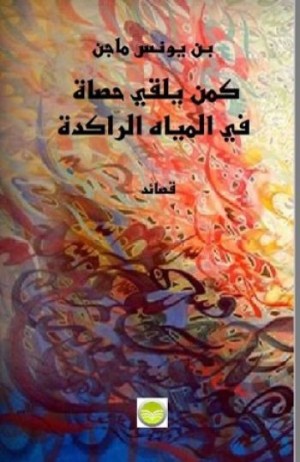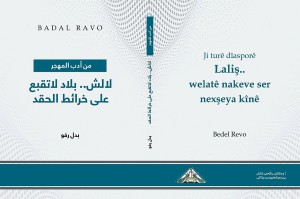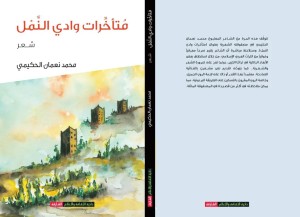نازك الملائكة
(0)
Further Reading
Related Articles
Poems by Nazik Al-Mala'ika
By: Nazik Al-Malaika
By: Nazik Al-Malaika
من شعر نازك الملائكة
By: Nazik Al-Malaika
By: Nazik Al-Malaika
شعر المرأة في ميزان النقد الحديث
By: Editor
By: Editor
لمحات من سيرة حياتي وثقافتي
By: Nazik Al-Malaika
By: Nazik Al-Malaika
Upcoming Events

Arabia Felix - Alarabia Alsaida in Bayt Yakan
April 15, 2025
Arabia Felix by Thorkild Hansen, and translated by...

A writer, a vision, a journey: a conversation with Professor Ilan Pappe
March 15, 2025
This event took place on 15 March, 2025 . You may...

مسافر يبحث عن ماء
February 17, 2025
تقيم نقابة اتحاد كتاب مصرشعبة أدب الرحلات تحت رعاي...

Online discussion of The Vegetarian by Han Kang Nobel Prize winner 2024
November 08, 2024
This discussion of Han Kang’s The Vegetarian...





Admin - 5 years ago
من ارشيف تعليقات القراء 2006
name: Ali Tal
There is no doubt that Nazik al-Mala’ika has made an indelible impression on Arab poetry and thus Arabic culture. Written between 1943 to 1949, this collection of her early work is original and strong yet ultimately melancholically tragic and very personal and private. The poet made no apologises for this as she openly declared in the poem ‘Accusation’. The bleary-eyed celebrity poet was obviously drunk with her own talent and apprehended behind a wall of her ego and self-absorption. Perusing through this huge volume I was frequently left with the impression that I was reading the same poem again and again which is hardly surprising as Nazik must have being working on several poems simultaneously. This book takes you on trip to visit a bizarre portrait gallery of gloomy still-life unlike any I have seen. In each and every poem the poet rubs shoulders with her own melancholy and sadness for no other apparent reason except perhaps an Iraqi love-affair view the tragic. Brought up in a rarefied atmosphere of academia there must have been heated and passionate debates about the questions of unshackling Arab poetry and thus the Arab people of their past that have now entered the mainstream. What is the 'law of Arab Poetry'? Nazik offered exemplary answers to this in the evolution of her work as it emerged after her encounters with the English romantic poets.
name: محمد عابد
تروي الشاعرة في مقدمة الكتاب قصتها مع الشعربشكل بسيط وواضح لكنه زاخر بالصدق، ولا يمكن أن أنسى قصة انجذابها للشعر الحر حيث باءت محاولاتها التقليدية بالفشل في الاعراب عن مشاعرها بمناسبة احتدام الكوليرا في مصر وتأثرها بعدد الوفيات والتي بلغت ألفا في اليوم الواحد وترتب على هذه التجربة مولد الشعر الحر وقصيدتها الخالدة المعروفة الكوليرا.
name: Rita
This is a wonderful volume of poetry and in a sense a cultural history of a certain period of the arab world. I was particluraly impressed that nazek’s parents became aware of her talent when she was very young and their response to this was to relieve her of all household chores in order to allow her to dedicate time to poetry. This is an excellent example of how parents can help to develop their children’s capacities. I am particularly impressed with these parents because this was a little girl in the 1930s.
name: Borhan Riad
The true introductions to this rich volume depict the cultural scene in a number of arab capitals in the 1940s as rich, diversified, and vibrant. I wonder what happened to the arab cultural renaissance. Today genuine cultural activity has regressed to the point of being negligible.
name:
نازك الملائكة شاعرة عبقرية لكنها حزينة ، وهو أمر مدهش فأين العلاقة بين الحزن والكآبة ومتعة الابداع وجماله، وأسوق مثلا على ذلك هذين البيتين: " جمدت فوق شقاء شفتاي وانحنت كفاي تحت الرعشات"
name: Nighty Reader
Abbas in Aidy's Being Abbas Al-Abd was pictured in some reviews as the representative of a generation, a perception that is so let's say political. Abbas's words can be the words of everyone to himself in certain points of ilumination, to get more clear, let me qoute from Abbas here: "How come if you don’t like fights, you go around grabbing onto people’s collars?” we discover at the end of the novel that Abbas siad this to himself, a totally different context. anyone of the readers can ask him/herself this question and finds out that yes: How come that I always say that I do not like fighting, yet I still go around grabbing onto people's collars? either to pay attention to what I'm saying or to pay attention to what I'm doing or to approve or to criticise or to guide or ...... and here are the tips that Abbas gave to himself in his first appearance to the narrator and in the novel: Forget everything. Remember that now you’re on your own. On your own, fool! Snap out of it, before you wake up one day- like maybe your fortieth birthday- to discover you’re as scared of death as you are of Hell, not because you’re afraid of dying but because you’re “Afraid of dying when you’ve never lived.” Your life really is your life, not a rehearsal or a blueprint. Tell yourself what you tell the others, but don’t believe it. They say, If you don’t do something to one of them, they’ll do it to you I say "If you don’t do something to yourself, they’ll do it to you And now please Do yourself a favor and do not waste time. Know the hidden enemy within yourself and let him out. Give him your weak points. Give him your blemishes and your multilated heart.Then kill yourself" They were said in Abbas's distinctive language,short sentences, imparatives -as he is to the world-,challenging, logical and really makes great sense. These tips- except the last one ofcours,though it is logical in the way Abbas puts it- are the clue to solve anyone's proplem, whatever it is, just forget it, and remember that you're on your own and that your life really is your life. The most genious advice is "Tell yourself what you tell the others, but do not believe it. The context was different before revealing the fact Abbas is one person, but when you put them in their right context, in the second reading, you might find out that you too, your other part might be calling you to do so.
name: عمرو محجوب
يتميز شعر نازك الملائكة بقوته وبساطته في الوقت نفسه، وهو شعر سهل الفهم بعيد عن التعقيدات اللغوية والتركيبية ويصل من القلب للقلب مباشرة.
name: عمران
اختيار هذا الشهر اضافة قيمة لمكتبة كل عربي فلا يحوي فقط جزءا كبيرا من انجاز الشاعرة نازك الملائكة القيم ولكنه يستعرض أيضا أهم ملامح سيرتها الذاتية ورؤيتها الفنية الخاصة وكيف أنها نشأت في مناخ شعري فريد.